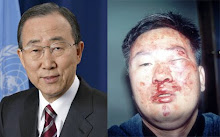http://www.koreatimes.co.kr/www/news/nation/2009/08/113_50132.html
By Kim Se-jeong
Staff Reporter
The issue of forced labor during the Japanese colonial period (1910-1945) is creating a new battle ― this time between the victims and their families and the South Korean government.
In response to the petitions, the Ministry of Foreign Affairs and Trade came out publicly after a long silence and said the government isn't willing to increase the amount of compensation.
The government's current compensation is based on an estimate in 1945, and victims have challenged it to raise the amount.
Successive governments have remained silent for many years, coming under attack as a result. Many victims and their families have also filed lawsuits against the Japanese government.
But, surprisingly, this time the government admitted that Japan had already paid compensation.
The administration said it came in the form of economic assistance of $3 billion, separate from the $5 billion in official development assistance that Japan gave to Korea in line with the reconciliation treaty in 1965.
Former President Park Chung-hee used all the funds to lay the foundations for economic development, such as building POSCO, according to the government.
The government gave only 300,000 won to each family of the dead during the colonial period, which the victims and their family members said was minimal.
During the annexation of the Korean peninsula in 1910, the Japanese government conscripted Korean citizens to work in factories or chemical plants, producing arms and weapons for the Japanese military in the Second World War.
Starting in 1939, Japan officially drafted Koreans in an attempt to fill the shortage of labor in Japan as a result of conscription into the militaryof Japanese males.
Of the draftees, about 670,000 were taken to mainland Japan for civilian work.
About 60,000 are reported to have died from harsh treatment and inhumane working conditions. Since 1946, Japan has begun repatriating them, while 650,000 chose to remain.
Coupled with sexual slavery by the Japanese military during wartime, compensation for forced labor has kept the controversy alive.
skim@koreatimes.co.kr
Friday, August 14, 2009
Subscribe to:
Comments (Atom)
